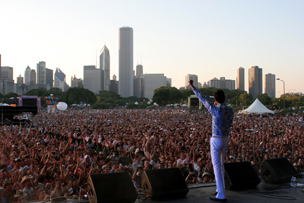What's It Worth To You?
By Lizz Kannenberg in Arts & Entertainment on Aug 15, 2007 5:45PM
You’ve got to hand it to the University of Chicago for releasing the findings of a study that calls out the City of Chicago for not nurturing its hometown music scene, right on the heels of the most lucrative 3 days on the city’s annual music calendar.
 The study examined the economic impact of the music industry on the 50 most populous metro areas of America, pulling together data like number of jobs related to the business and annual revenue attributed to music in each city, and Chicago ranked no worse than fourth in any measurable category (ticket sales, seating capacity, record sales, etc.). The study also found that 53,000 people in Chicago work in some capacity in the music industry, which generated $818 million citywide in 2004. Both numbers place us in a solid third after the coastal hot spots of New York and Los Angeles, which (just about anyone, from industry insider to casual MTV viewer, will tell you) seems about right.
The study examined the economic impact of the music industry on the 50 most populous metro areas of America, pulling together data like number of jobs related to the business and annual revenue attributed to music in each city, and Chicago ranked no worse than fourth in any measurable category (ticket sales, seating capacity, record sales, etc.). The study also found that 53,000 people in Chicago work in some capacity in the music industry, which generated $818 million citywide in 2004. Both numbers place us in a solid third after the coastal hot spots of New York and Los Angeles, which (just about anyone, from industry insider to casual MTV viewer, will tell you) seems about right.
Much of what the study bases its chiding of Chicago on is fairly subjective - that outsiders don’t associate Chicago with a vibrant music scene like they would Nashville or Austin. The two-year-old Chicago Music Commission is working to change that perspective, both internally and beyond the city limits, but there are certain immoveable obstacles to nurturing a niche industry in a huge city. Even in New York, the thriving independent scene that the rest of the country associates with that city isn’t on the Upper West Side of Manhattan or on Staten Island - it’s in a couple of very self-contained areas of Lower Manhattan and Brooklyn. Events like the CMJ New Music Marathon, one of the two most important music conferences in the U.S., barely registers on most New Yorkers’ radars. Smaller cities like Portland or Austin are able to envelope their music industries in community-wide support and hang their hats on the local scenes because, to those communities, having a vibrant music scene is integral to the image of the city as a whole. Austin can turn every public venue into a performance space during South By Southwest each year because the city relies on its association with live music and its reputation as an accommodating host to that ultra-important event.
For right or wrong, it seems as though Chicago has far more lucrative industries to court - telecomm, manufacturing, airlines - and far more bureaucracy to deal with as the country’s third largest metropolitan area to spend much time or effort on catering to the underground music business. Bummer, because we think we’ve got one of the most nurturing and consistently productive scenes in the world.
What do you think? How can the City of Chicago best support its music community?